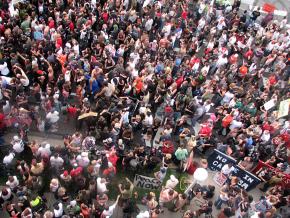Voices outside the convention
reports from Denver on the protests against the war and for immigrant rights.
PROTESTERS IN Denver made sure that Barack Obama and the delegates to the 2008 Democratic National Convention couldn't ignore demands for an immediate end to the Iraq war and legalization of undocumented workers.
Several days of protests culminated in a large antiwar march on Wednesday night. With Joe Biden, Obama's running mate and architect of an idea to partition Iraq into three ethnic mini-states, preparing to speak that night, more than 10,000 people gathered across town to hear Rage Against the Machine play at the Denver Coliseum.
Most who showed up came to hear the famously left-wing band rock the Coliseum. But Rage shared the stage with Iraq Veterans Against the War (IVAW), who explained their demands and invited attendees to join them in a four-mile march to the Pepsi Center, where the Democrats were meeting.
"You all are veterans, too--veterans of the streets of Denver," said IVAW member Jeff Keys. "I thought I was serving my country. Now I'm home, and I'm serving all the people of the world by ending this war. Obama says he's going to end the war, and he's going to bring the veterans home. So we're waiting."

IVAW members had given Obama a 3 p.m. deadline on Wednesday to meet with them. At 3, the march started. With thousands of people behind them, the IVAW led the crowd in chants of "I'm for makin' change, not for waitin' for elections."
IVAW member Maggie Martin from Georgia said the group wants the Democrats to adopt its demands for immediate withdrawal of all troops, adequate care for returning veterans and reparations for the Iraqi people. "We don't necessarily think that's really going to happen," Martin said. "But the secondary goal is to show that we have strength, we have people, we have power, and we won't allow the media to block our message.
Kelly and Jill called in sick to their retail sales jobs to join the march. "We're 'sick,'" Kelly explained. "But we need to protest this unjust war. I hope that Obama will change everything, but I don't know. He's certainly more likely to listen because of this protest."
As IVAW member Phil Aliff added, "A lot of people may have been sitting on the fence before this. But after this week, people are more entrenched in the struggle. I think more people have seen what it will take."
When the march got to the convention site, delegates streaming out of the convention center wondered why veterans were being held behind 15-foot fences and concrete blocks. Democratic officials came out to diffuse the situation, inviting two IVAW members to meet with Obama's team. The IVAW members were told that their platform would be read to the delegates. As this article was written, it was unclear whether the Obama team had followed through on its promise.
"Neither the Republicans nor the Democrats are the savior," said IVAW member Eli Wright. "But since Obama's inspired people for change, when he gets elected, people will see him not coming through. And his failures will inspire people that they need to fix it themselves."
THE FOLLOWING morning, 2,500 people gathered for a protest organized by the We Are America Alliance in Denver. The march demanded an end to immigration raids and deportations and for a path to legalization for all 12 million undocumented workers.
Irvin from Denver North High School, who carried a sign saying "Friends don't let friends get deported," had gotten a permit to leave school by having his parents write a note. "I want immigrants to get a better deal, and I want them to pass the Dream Act," he said. "Obama is in a hard situation. Even if he does want to pass something better, he has to go through the Democratic and Republican legislators. Hopefully today, we'll revive this issue for the election."
Some marchers wore Obama T-shirts and chanted, "Obama, amigo, estamos contigo." (Obama, friend, we're with you)
Others looked at it differently. Gloria Saucedo of Hermandad Mexicana-Oxnard traveled to the protest with 47 people from her area--a 20-hour trip in each direction--to bring a message to the DNC. "It doesn't matter who's president, but what people are doing," she said. "I think that there will be more protests if he gets elected and doesn't work for legalization. I will ask people to vote in November, but more importantly, we have to mobilize in 2009."
Jacinta Lobatl, an organizer with the We Are America Alliance, said, "This is an issue I've been fighting for 10 years. We need it to be raised on a national level rather than a local one. Obama hasn't really addressed this issue. Last March, we had about 20,000 march for our 'Day Without a Mexican' to prove that migrants are needed in our economy, and it would have a huge effect if they weren't here."
Noting the turnout was fewer than the alliance expected. Lobatl said, "I wish we would have combined efforts with the anti-war march yesterday." Others attributed the size to the rumor spread in Spanish-language media that ICE would visit the protest.
Whatever the size, organizers were right to stress that the most important thing about the protests this week is their role in preparing people to fight when the reality of an Obama administration doesn't meet the expectations that people place in him.


